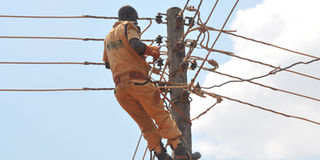Electricity distributor throws in towel

What you need to know:
- Ferdsult’s failure to connect more people to power was largely because its connection fee is high
- The company’s no–pole connection costs Shs1.1 million, of which Shs49, 000 was the inspection fee, Shs492, 000 the capital contribution fee and Shs560, 000 the connection fee
- In comparison, a no-pole connection by Umeme, which distributes 97 per cent of the electricity generated in Uganda, costs Shs147, 000 (Shs49, 000 inspection fee and 98, 000 connection fee)
Ferdsult Engineering Services Limited (FESL), the company distributing electricity to parts of rural western Uganda has thrown in the towel.
The company says it is expensive to distribute power in such areas.
“One has to drive for long distances to serve one potential customer,” Ferdsult’s planning and finance director, Bonny Kiiza, told the Daily Monitor on Sunday, February 19.
“Our tariff for domestic customers is Shs511 per unit. Umeme’s customers pay Shs696.9. We couldn’t recover our operating costs. So we have decided to quit.”
Mr Kiiza said they have written to the Electricity Regulatory Authority (ERA) to inform ERA that Ferdsult would not renew its license to distribute power in seven districts.
ERA’s Manager Consumer and Public Affairs, John Julius Wandera, affirmed this.
He added that ERA has nominated the Uganda Electricity Distribution Company Limited to take over the distribution network in the FESL’s service areas.
“The nomination is aimed at ensuring continuity of services after termination of the FESL licenses on 28 February,” Mr Wandera said.
FESL’s license to distribute power in Kibaale, Kyenjojo, Rukungiri, Kanungu, Masaka, Rakai, Isingiro districts is due to expire on February 28.
The company, according to its agreements, could have applied for a renewal of the license had it wanted to.
That it did not could make those interested in investing in mini or isolated grid projects to think about challenges power utilities.
The government, on the other hand, will have to think of how to increase access to electricity, especially in the rural areas.
Some are already suggesting that besides subsidising the connection costs, the government should also, for the benefit of the peasants in the rural areas, subsidise the end–user tariffs.
Ferdsult’s failure to connect more people to power was largely because its connection fee is high.
The company’s no–pole connection costs Shs1.1 million, of which Shs49, 000 was the inspection fee, Shs492, 000 the capital contribution fee and Shs560, 000 the connection fee.
In comparison, a no-pole connection by Umeme, which distributes 97 per cent of the electricity generated in Uganda, costs Shs147, 000 (Shs49, 000 inspection fee and 98, 000 connection fee).
Mr Kiiza said now the company is exiting the power distribution business, it would focus on treating and selling electricity poles to the distribution companies.
“Power distribution is not the only business we have; we do cage fish farming in Lake Victoria,” Mr Kiiza said.


